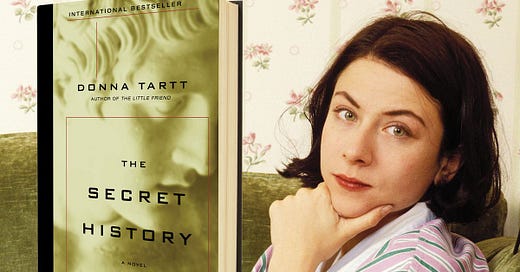Published: 1992 | 559 pages
Happy Friday readers,
I’m 30 years late to the party, but I finished this book last week and have to talk about it. This could be recency bias, but Donna Tartt is punching in a different weight class than most. After reading the last page, the first thought that came to mind was: “I’ve just experienced mastery.”
What made this book so effective for me? I will admit it wasn’t the plot or the characters. In fact, I’m not going to give a plot summary or mention any of the characters because I don’t think that will spark your interest in the book (it may even do the opposite!).
What I want to talk about are two things that Tartt does that made the reading experience unique and memorable.
1. Tartt eviscerates all your hope.
Here is a graph of hope over time while reading:
I’m being a little cheeky, but from the opening line things start out bleak:
The snow in the mountains was melting and Bunny had been dead for several weeks before we came to understand the gravity of our situation.
I’m not joking — that is the first line! The story manages to get to a place resembling hopeful, and then proceeds to careen off multiple cliffs (pun intended). Forget a happy ending, a redemption arc, or even a tidy moral. Things unravel in a way that is surgical and thorough and Tartt doesn’t leave you with any false hope.
You may be asking yourself why you’d want to read a book that leaves you feeling Greek tragedy levels of despair. I’m not well versed in Greek tragedies, but I am familiar with the sensation of a Shakespearean tragicomedy. My favorite is Much Ado About Nothing thanks to Kenneth Branagh’s 1993 version. Each time I watch the drama unfold, it feels both inevitable and completely avoidable.
That’s what Tartt does as well. As a reader, you can see the decisions that are taking the characters closer and closer to disaster. It’s obvious! No, stop, turn around! Yet each step seems inevitable knowing what you know about these people. They are utterly hopeless! I relish in the brutal honesty of it and, to steal a line from AMC Theatres: “Heartbreak feels good in a place like this.”
2. Tartt takes you on a journey.
Tartt took me on a journey that she designed, constructed, and then served as trail guide, pointing out certain sights and scenery along the way. She was in complete creative control from beginning to end, knowing exactly where she wanted to go, how to get there, and each sentence served that end.
Though it’s a journey I’ll probably only make once, I’m sure multiple readings are rewarded.
When I read The Goldfinch in 2016, it set a new bar for what a book can be. My experience with The Secret History also stands alone because I’m still figuring out how to talk about it.
I’d love to know your thoughts on this book or if you’ve had a similar experience with a different book. Let me know in the comments!
Thanks for reading,
Kyle






Just finished it moments ago. That graph 📉 is so accurate. I’m still processing…
I like the "dark academia" genre, and apparently, this book is why that genre exists. Everything else gets compared to it. I haven't pulled the trigger on this yet though. I'm that weird person that hated the Goldfinch - and particularly hated the characters - so I've been really hesitant on The Secret History.